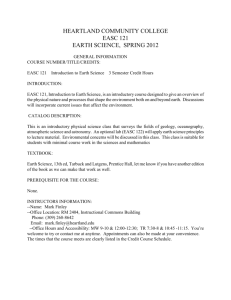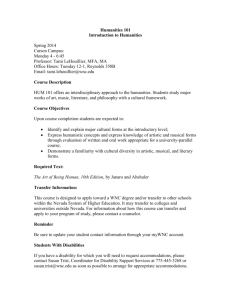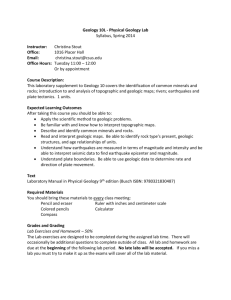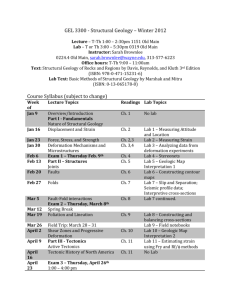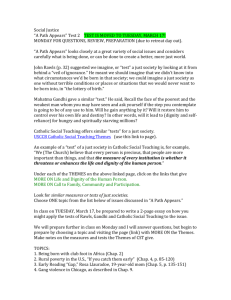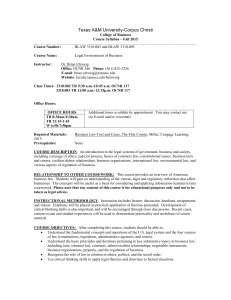syllabus - Dixie State University
advertisement
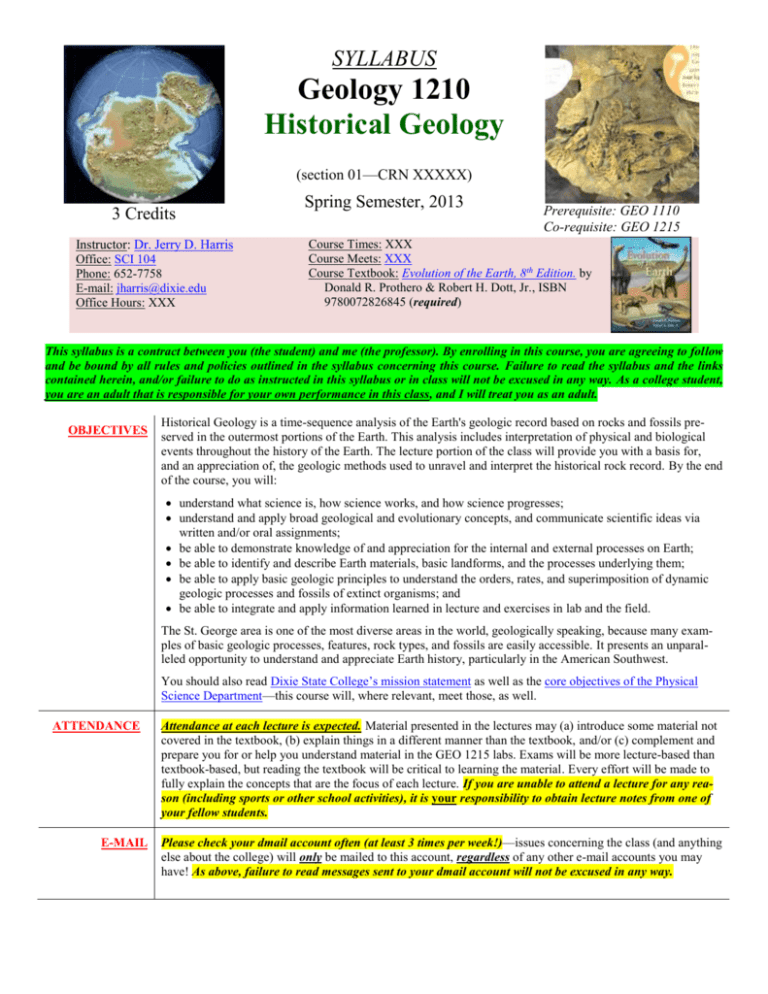
SYLLABUS Geology 1210 Historical Geology (section 01—CRN XXXXX) 3 Credits Instructor: Dr. Jerry D. Harris Office: SCI 104 Phone: 652-7758 E-mail: jharris@dixie.edu Office Hours: XXX Spring Semester, 2013 Prerequisite: GEO 1110 Co-requisite: GEO 1215 Course Times: XXX Course Meets: XXX Course Textbook: Evolution of the Earth, 8th Edition. by Donald R. Prothero & Robert H. Dott, Jr., ISBN 9780072826845 (required) This syllabus is a contract between you (the student) and me (the professor). By enrolling in this course, you are agreeing to follow and be bound by all rules and policies outlined in the syllabus concerning this course. Failure to read the syllabus and the links contained herein, and/or failure to do as instructed in this syllabus or in class will not be excused in any way. As a college student, you are an adult that is responsible for your own performance in this class, and I will treat you as an adult. OBJECTIVES Historical Geology is a time-sequence analysis of the Earth's geologic record based on rocks and fossils preserved in the outermost portions of the Earth. This analysis includes interpretation of physical and biological events throughout the history of the Earth. The lecture portion of the class will provide you with a basis for, and an appreciation of, the geologic methods used to unravel and interpret the historical rock record. By the end of the course, you will: understand what science is, how science works, and how science progresses; understand and apply broad geological and evolutionary concepts, and communicate scientific ideas via written and/or oral assignments; be able to demonstrate knowledge of and appreciation for the internal and external processes on Earth; be able to identify and describe Earth materials, basic landforms, and the processes underlying them; be able to apply basic geologic principles to understand the orders, rates, and superimposition of dynamic geologic processes and fossils of extinct organisms; and be able to integrate and apply information learned in lecture and exercises in lab and the field. The St. George area is one of the most diverse areas in the world, geologically speaking, because many examples of basic geologic processes, features, rock types, and fossils are easily accessible. It presents an unparalleled opportunity to understand and appreciate Earth history, particularly in the American Southwest. You should also read Dixie State College’s mission statement as well as the core objectives of the Physical Science Department—this course will, where relevant, meet those, as well. ATTENDANCE E-MAIL Attendance at each lecture is expected. Material presented in the lectures may (a) introduce some material not covered in the textbook, (b) explain things in a different manner than the textbook, and/or (c) complement and prepare you for or help you understand material in the GEO 1215 labs. Exams will be more lecture-based than textbook-based, but reading the textbook will be critical to learning the material. Every effort will be made to fully explain the concepts that are the focus of each lecture. If you are unable to attend a lecture for any reason (including sports or other school activities), it is your responsibility to obtain lecture notes from one of your fellow students. Please check your dmail account often (at least 3 times per week!)—issues concerning the class (and anything else about the college) will only be mailed to this account, regardless of any other e-mail accounts you may have! As above, failure to read messages sent to your dmail account will not be excused in any way. LECTURES All lectures center around PowerPoint presentations; text-free versions of these are available on the course’s Blackboard site. These are designed for you to take notes directly on them —that way, you don’t have to scramble to sketch diagrams, write, and pay attention all at the same time. But however you take notes, you should be writing down much more than the bullet points on the slides—what I say verbally will be, in most cases, far more important to your understanding of the material (and the exams) than the outlines on the slides! Taking fast, accurate notes is a skill you are expected to possess or develop quickly—I cannot slow down the presentation of material and end up leaving out any material! To facilitate note taking, I will provide you with a list of text abbreviations that can help you take notes more quickly, but you are strongly encouraged to either add to it or create your own system. I can recommend some other note-taking techniques if you are interested. ASSIGNMENTS Assignments are due one week from the day they are handed out (or the first class thereafter if the following week is a holiday). Assignments will not be accepted after the due date unless you have prior consent from me—this includes athletic activities! There are three kinds of assignments: Several General Assignments worth 25 or more points each. Many will involve in-class activities, but all will involve some work outside of class. These are designed to give you some first-hand experience and/or practice with material presented in class. Material from these exercises is fair game for exams! Answer keys will be posted on Blackboard following each due date. A mandatory Field Exercise worth 75 points toward the end of the course (time and date to be discussed in class) around Washington County to see first-hand many of the geological features and concepts discussed in class. The trip will last 5-6 hours. Wear weather-appropriate clothes and sunscreen. Bring a lunch, something to drink, and a hat. Wear sturdy shoes or boots, not sandals or flip-flops: some treading through scrub brush and over rocks may be involved, but no intense hiking. I highly recommend wearing jeans or other long pants. Failure to participate in any activities during the field trip may result in loss of points on the exercise. EXTRA CREDIT! On the first day of class each week (and only on that date), you can hand in a Geology News Journal in a small Blue Book in which you have entered an original written/typed paragraph or two summarizing (not copying!) an item concerning something geological related directly to the subject material we are covering in class for that week from a news media source (newspaper, magazine, news-oriented web site, article archive, etc.). Each entry will be worth a maximum of 5 points. Your entry must include (a) what the discovery/event is, (b) how it is relevant, and (c) what your source is for the article. I will only accept entries that are from June, 2010 or later and you must include the full URL of any web page consulted! Entries from blogs or places like Wikipedia, geology.com, etc. will not count—these are not news articles. Lastly, you may use the same topic only once during the semester! For example, if you already have an entry about an earthquake, you cannot write about another earthquake for credit. A note on spelling: in general, I do not count off for spelling on exercises or exams…with three exceptions: 1. If you misspell (including capitalization!) a name or proper noun, I will take off ½ point. 2. If you misspell a word that we have gone over in class, I will take off ½ point. 3. If you misspell a word given to you in a question or explanation, I will take off 1 point. Cheating, which includes turning in identical work as another student, will not be tolerated and will result in a 0% grade on any exercise, including the media journal entries. Repeated offenses will be reported to the Student Affairs Committee as per the Academic Integrity Code. EXAMS There will be four exams: three mid-terms during the course of the semester worth 100 points each, and one partly cumulative final exam worth 130 points. Each exam covers material since the previous exam, but because all the material in the course builds on previous material, your understanding of all older material will benefit you greatly! Unless announced otherwise, exams will be held in the Testing Center (hours of operation are posted on-line), except for the final which is held in the classroom during the normally scheduled time. RECOMMENDATION: Try to avoid simply memorizing facts—if you devote time and effort to understanding concepts, you will perform better on exams. Of course, like any introductory course, there will be many new words and concepts that you will be expected to learn, and this will require some degree of memorization. But like any subject, the material and concepts covered in this course form an integrated whole—every piece connects to every other piece in some way. If you devote the time and effort to understanding the concepts and being able to perceive how they relate, you will perform better on assignments and, especially, exams. Memorization is not the point of the class and should be minimized. Cell phones may not be brought in to exams and cannot be used as calculators for exams. GRADING Your exercise, exam, and course grades will be determined on a flat scale based on point values as follows: ≥ 93 = A 90–92.9 = A87–89.9 = B+ 83–86.9 = B 80–82.9 = B77–79.9 = C+ 73–76.9 = C 70–72.9 = C67–69.9 = D+ 63–66.9 = D 60–62.9 = D< 60 = F CHECKING YOUR GRADES: I do not post grades publicly for many reasons. But whenever you want to know how you’re doing in the class, either (a) stop by during my office hours, (b) call me in my office, or (c) email me and I will be happy to give you your scores. At the end of the semester, I will also take your course participation into account: if you have participated often and shown genuine interest, and your final grade is near a boundary between two grades, I will “bump” you into the higher grade category. DISRUPTIVE BEHAVIOR Classrooms are special environments in which students and faculty work together to promote learning and growth. It is essential in these environments that respect for the rights of others seeking to learn, respect for the professionalism of the instructor, and the general goals of academic freedom are maintained. Students engaged in disruptive behaviors, such as chatting during lectures, arriving late to class, sleeping, texting/instant messaging, game playing, reading non-class material, and others listed in the DSC Student Rights and Responsibilities Code, will be given verbal, then written warnings; repeated infractions may result in removal from class. Repetitive or seriously disruptive behavior, such as fighting, using profanity or insults, making personal or physical threats, or damaging property, will be reported to Campus Security. As the instructor, it is my responsibility to determine whether any specific student is disrupting the learning environment. Cell phones and music players must be turned off during the lectures. Mobile devices may be used for note-taking, recording, and looking up course-appropriate material, but must have all sounds muted or off; they cannot draw attention away from the learning environment for either the professor (me) or any students. BOILERPLATE Student Support Services For information on the following resources available to you at Dixie State College, please visit the following web sites (click on the name to go there): Library and Library Services Writing Center Tutoring Center Computer Lab Testing Center Student Support Services The DSC library has many books on geology that you may wish to consult for additional information. There is a huge number of web sites on these subjects (you can find many via Google or other search engines; I will also be happy to recommend some if you are interested). However, be very cautious when getting information from web sites!!! Much of what is “published” on the Web is either not up-to-date or, more importantly, not scientific—only trust material that comes from a reliable, scientific source! If you come across information that you feel is suspect, or that contradicts something I’ve said in lecture or that is in the textbook, please let me know, and I’ll be happy to discuss the matter with you to clear up any potential confusion. Drop fees ($10/class) begin XXX; XXX is the last day to drop this course; XXX is the last day for a complete withdrawal. You can read the withdrawal policy here, and see the complete academic calendar here. Academic Integrity and Discipline The faculty and administration of Dixie State College are opposed to cheating and plagiarism in any form. Any student found cheating or plagiarizing should expect to receive a failing grade and be removed from the class. Expulsion from the college may also result. No credit will be given if it is found that a student has copied someone else’s work, including fellow students, authors of books, magazines, or journals from a library or the WorldWide Web. The full policy can be read here—don’t say I didn’t warn you! ADA Accommodations If you are a student with a medical, psychological, or learning difference and request reasonable academic accommodations due to this disability, you must provide an official request of accommodation to me from DSC’s Disability Resource Center (DRC) within the first two weeks of the beginning of classes. Students are to contact the DRC to follow through with, and receive assistance in, the documentation process to determine the appropriate accommodations related to their disability. You may call (435) 652-7516 for an appointment and further information regarding the Americans with Disabilities Act (ADA) of 1990 per Section 504 of the Rehabilitation Act of 1973. I am happy to work with anyone with special needs; I just need to see the letter of accommodation that the DRC provides. Other Information Please read the boilerplate here—everything at this site that isn’t explicitly stated on this syllabus still applies to all students! EXPECTATIONS If you’ve read through the above (congratulations!), you have some understanding of what is expected of you as a student in this class. However, you should also have some expectations of me (your professor), and my goal is to meet those expectations. I will come to class prepared. I will grade things and return them to you in a reasonable amount of time (I generally aim for within a week), but any graded work that remains uncollected for a month will be shredded and recycled. I keep graded exams for two semesters, and then they too are shredded and recycled. I will make myself available to you to answer questions, give advice, or just listen and talk about absolutely anything if you need it. Lastly, I will do what I can to accommodate you when issues arise that interfere with your ability to attend lectures, do exercises, or take exams—stuff happens, and I get that. I will happily work with you to help you succeed in the class, but I need to be notified ahead of time. Here’s looking forward to a great class with you! Course Outline This is the material that will be covered in class, in this order. Days and dates on which the material will be presented are flexible and subject to change; dates of exams will be announced in class. Subject Introduction Time and Terrestrial Change; Floods, Fossils, and Heresies Evolution and Systematics Geologic Time Geologic Time Scale, Fossil Succession, Biostratigraphy, and Correlation Radiometric Dating Origin and Early Evolution of the Earth Mountain Building and Drifting Continents The Cryptozoic Early Life and Its Patterns Early Paleozoic Geology: Sauk Sequence & Orogenic Belts Early Paleozoic Life Middle–Late Paleozoic Geology: Final Retreat of the Sea Late Paleozoic Life The Mesozoic Era Geology: Evolution of Western North America Mesozoic Life The Cenozoic Era Geology: The Pacific Ocean and Cordillera Paleocene–Pliocene Life The Cenozoic Era Geology: The Last Ice Age Pleistocene-Holocene Life and Human Evolution Humans and the Earth Relevant Textbook Pages n/a Chap. 1: 4–13; Chap. 2: 16–36 Chap. 3: 39–64; Appendix A-I: A-1–10 Chap. 4: 67–84; Chap. 5: 87–99 EXAM #1 will cover this material. Chap. 6: 101–118; Chap. 7: 121–147 EXAM #2 will cover this material. Chap. 8: 151–178; Chap. 9: 181–203 Chap. 10: 207–228; Chap. 11: 231–255 Chap. 12: 259–296; Chap. 13: 299–348 EXAM #3 will cover this material. Chap. 14: 352–409 Chap. 15: 413–460 Chap. 16: 465–499; Chap. 17: 503–522 EXAM #4 will cover this material and be partly cumulative FINAL EXAM: XXX Important Dates—Other dates that may be important to you can be viewed here. Monday, Jan. 16 = Martin Luther King Day—NO CLASS! Monday, Feb. 21 = President’s Day—NO CLASS! Monday-Friday, Mar. 14-18 = Spring Break—NO CLASS! Thursday, Apr. 28 = Last day of classes Friday, May 6 = GRADUATION
